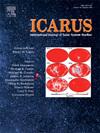软骨熔体凝固的数值模型
IF 2.5
2区 物理与天体物理
Q2 ASTRONOMY & ASTROPHYSICS
引用次数: 0
摘要
在这项研究中,我们提出了一种新颖的数值方法,用于模拟橄榄石单晶体在孤立的多组分硅酸盐液滴中的生长动力学。我们旨在从理论上复制在软玉中观察到的凝固纹理。该方法利用了相场模型,这是一个用于模拟合金凝固的成熟框架。这种方法可以计算三元氧化镁-氧化铁-二氧化硅体系的凝固过程。此外,该模型还结合了晶体结构固有的界面自由能和生长动力学的各向异性特征。在此,我们研究了一种各向异性模型,该模型能够在二维建模的约束下再现实验观察到的橄榄石单晶生长模式对过冷度的依赖性。通过独立调整界面自由能和生长动力学的各向异性程度,我们成功地实现了不同橄榄石晶体形态的定性复制,从低过冷度时的多面体到高过冷度时的细长针状结构。这种计算驱动的方法为从理论上再现软玉的凝固纹理提供了一种独特的开创性方法。本文章由计算机程序翻译,如有差异,请以英文原文为准。
Numerical model for the solidification of a chondrule melt
In this study, we propose a novel numerical method to simulate the growth dynamics of an olivine single crystal within an isolated, multicomponent silicate droplet. We aimed to theoretically replicate the solidification textures observed in chondrules. The method leverages the phase-field model, a well-established framework for simulating alloy solidification. This approach enables the calculation of the solidification process within the ternary MgO–FeO–SiO system. Furthermore, the model incorporates the anisotropic characteristics of interface free energy and growth kinetics inherent to the crystal structure. Here we investigated an anisotropy model capable of reproducing the experimentally observed dependence of the growth patterns of the olivine single crystal on the degree of supercooling under the constraints of two-dimensional modeling. By independently adjusting the degree of anisotropies of interface free energy and growth kinetics, we successfully achieved the qualitative replication of diverse olivine crystal morphologies, ranging from polyhedral shapes at low supercooling to elongated, needle-like structures at high supercooling. This computationally driven method offers a unique and groundbreaking approach for theoretically reproducing the solidification textures of chondrules.
求助全文
通过发布文献求助,成功后即可免费获取论文全文。
去求助
来源期刊

Icarus
地学天文-天文与天体物理
CiteScore
6.30
自引率
18.80%
发文量
356
审稿时长
2-4 weeks
期刊介绍:
Icarus is devoted to the publication of original contributions in the field of Solar System studies. Manuscripts reporting the results of new research - observational, experimental, or theoretical - concerning the astronomy, geology, meteorology, physics, chemistry, biology, and other scientific aspects of our Solar System or extrasolar systems are welcome. The journal generally does not publish papers devoted exclusively to the Sun, the Earth, celestial mechanics, meteoritics, or astrophysics. Icarus does not publish papers that provide "improved" versions of Bode''s law, or other numerical relations, without a sound physical basis. Icarus does not publish meeting announcements or general notices. Reviews, historical papers, and manuscripts describing spacecraft instrumentation may be considered, but only with prior approval of the editor. An entire issue of the journal is occasionally devoted to a single subject, usually arising from a conference on the same topic. The language of publication is English. American or British usage is accepted, but not a mixture of these.
 求助内容:
求助内容: 应助结果提醒方式:
应助结果提醒方式:


